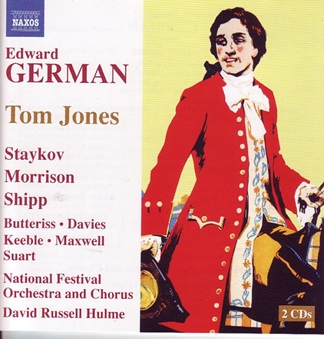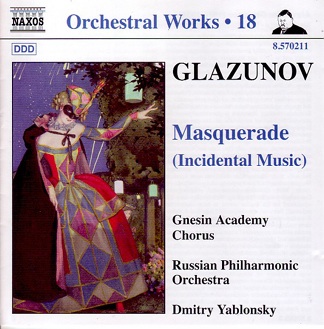CD and DVD Reviews
By FRANK BEHRENS
ART TIMES October 2009
 |
A Great Comic Novel Makes a Good Comic Musical— Based on the 1749 novel “Tom Jones” by Henry Fielding, the 1907 opera of the same name has a foot and a half in the old operetta tradition and the other half foot in the modern musical comedy. Composer Edward German (1862-1936) is gaining some recognition recently through his orchestral pieces released on Naxos CDs. And now the Naxos release of a 2-CD set of “Tom Jones” should redress that wrong.
Note that the dialogue is not on the recording (which is usually a plus), so one can concentrate on the lyrics and music. The text is not included in the booklet but can be downloaded from the website given on the jacket. It takes only 10 pages and I found it absolutely necessary to understanding and appreciating the lyrics of Charles Taylor. They are merely adequate, though a touch above what Victor Herbert had to deal with.
I could not help but spot many reminders (shall I call them?) of Gilbert and Sullivan’s lyrics and scores. The opening number made me think I was hearing that of “The Grand Duke,” which it much resembles. There is a garden-metaphor aria that is right out of “Ruddigore,” a sad madrigal that recalls that in “The Mikado,” the use of Latin and Italian phrases like those in “Iolanthe.” Yet there is seldom a line that lingers in the memory after one hearing.
Another need for the printed libretto is the occasional use of the Somerset accent in such lines as “[a] zwinging zign zo all may zee/Under the green bough.” It certainly adds to local color but not to the understanding; but only one character uses it and the ear becomes accustomed after a hearing or two.
All things considered, however, it is a joyful little romp and quite worth the hearing.
The cast is a very good one, handling the old-fashioned lyrics without camping them up: Marianne Hellgren Staykov (Sophia), Richard Morrison (Tom), Heather Shipp (Honour), Donal Maxwell (Squire Western), Simon Buttries (Gregory), and Richard Suart (Partridge) in the leads. David Russsell Hulme conducts the National Festival Orchestra and Chorus with gusto. All repertory companies should consider this musical for a presentation in the near future and purchase this album right quick!
“Siegfried”: Good Directing, Poor Sets— While most of the video productions of Wagner’s “Siegfried” are staged as “concepts,” too stupid to tolerate, the Warner Classics DVD of a 1992 performance at the Bayreuth Festival does not fare too badly. Yes, the costumes are of the “updated-timeless” (and most unattractive) sort, while the setting for Act I is a sort of boiler room, for Act II a bombed out building, and for Act III a featureless wasteland with Brunnhilde asleep in a neon cube.
What redeems this version is an excellent cast, headed by the appropriately named Siegfried Jerusalem. He is ably supported by Graham Clark (Mime), John Tomlinson (Wanderer/Wotan), Gunter von Kannen (Alberich), and Anne Evans (Brunnhilde). Jerusalem puts, as some critic wrote, his usual 200% into the role, as he did in the more conventionally staged Metropolitan Opera cycle back in 1990. That is the one I would suggest for beginners, this one on Warner Classics for those who want a production that moves, albeit against a less than sensible background.
Daniel Barenboim conducts with gusto. The running time is 244 minutes, the picture is in widescreen format, and there are subtitles in five languages.
Quartet Arrangement of “Don Giovanni” is Fascinating— Considered by some to be the greatest opera of them all, Mozart’s “Don Giovanni” boasts of memorable characters, each carefully delineated by their vocal lines. Rare among operas also is the marvelous score in which just about every aria and ensemble is both memorable and beautiful.
This is why the score fares so well even without the words. Indeed, even in Mozart’s day, settings for chamber ensembles of selections from the score were very popular. Ten years after the 1788 premier of “Don Giovanni,” a version appeared that was scored for a string quartet, a version that kept the music to just about every bar of the original, except for the dry recitatives.
This arrangement (by a person unknown) is now available in a 2-CD set on the ATMA Classique label, played by Quatuor Franz Joseph. There are 28 selections in all, two of which are the complete finales to Act I [18:48 min.] and II [23.21 min.]—and not a dull moment in any of it. It took my ear a few moments to get used to the sound (I am used to either the full opera or wind ensemble arrangements), but this is going to get a lot of play in my house in the years to come.
Supremely Beautiful Music Sung by King’s College Choir— I have no idea how many recordings were made by the choir of King’s College, Cambridge, but the EMI 2-CD set titled “England, My England” is filled with 40 selections from discs released from 1976 to 2009. It also happens to be one of the most beautiful collections of vocal music I have heard in quite some time!
Most of the songs are religious in nature—“Lux aeterna,” “Evening hymn,” “Psalm 23” and “Jubilate Deo,” to name just a few. Two are composed for coronations, a very few are more secular in nature. Among the older composers are Byrd and Gibbon; among the more recent are Britten and Delius.
The program notes state, “There is surely no more quintessentially English sound than that of the Choir of King’s College, Cambridge.” While that ambiguity might be disputed, one will agree with it while hearing these magnificent performances.
Galway Plays His Favorite Selections— The appearance of the RCA Red Seal CD titled “James Galway Celebrating: A Collection of Personal Favorites” coincides with my finishing a book about the decline and passing of classical recordings in general. Opera is no longer recorded in the studio by major labels, while many orchestral releases are merely compilations of selections from older recordings.
Although I lost track of how many Galway collections I have owned, it is always good to hear yet another, even if it is the same selections as before in a different order. So in the 19 tracks on this disc, there is music by Vivaldi, Bach, Rimsky-Korsakov, Debussy, and Rachmaninoff. Among the familiar titles are the theme from “The Pink Panther,” “Danny Boy,” and “La vie en rose.” “Skylark” includes a vocal by Cleo Lane.
Just how “hand picked” they really are by the Irish flautist is beside the point. It is all very lovely and the CD makes a nice little gift when one goes visiting. But when will those arrogant art departments stop printing program notes in white letters over a textured gray background?
 |
Incidental Music to “Masquerade” is Restored— For lovers of Russian music as it was before the Revolution, the works of Alexander Glazunov (1865-1936) can stand as excellent examples of stirring scores that reflect the past history of Russia and the splendor of the courtly under the Tsars.
For example, the Naxos CD of “Masquerade (Incidental Music)” expands on the “Masquerade Suite” that has so often filled in recorded collections of Russian scores. Asked to compose music for the play “Masquerade” by one Lemontov, Glazunov obliged with 26 very short pieces that introduced a new act or accompanied pantomimes and dances. Existing only in manuscript form, the score offers a challenge to any conductor who has to place them in what might have been the order played during performances of the play.
Even if some are out of place, the score on this CD is quite enjoyable—never quite reaching to the heavens as Tchaikovsky’s could do, but competent for what they were supposed to accomplish. The program notes give a summary of the plot, which might help some. Most will just enjoy the music on its own terms.
To flesh out the 67-minute disc, three other Glazunov pieces are included: “Two Pieces, Op. 14,” “Pas de caractere, Op. 68,” and “Romantic Intermezzo, Op. 69.” The Gnesin Academy Chorus and Russian Philharmonic Orchestra are conducted by Dmitry Yablonsky.
A Good Introduction to an Often Ignored Composer— Franz Danzi (1763-1826) is not a composer with a high-recognition name, and recordings of his work are at a premium. The latest Penguin Guide lists only two CDs of his wind music, to which New Classical Adventure has just added a third, “Franz Danzi: Complete Wind Quintets.” The Reicha’sche Quintet plays on period instruments to fine effect.
This 3-CD set includes three quintets each from Danzi’s Op. 56, 67 and 68. And they all afford a lovely listening experience. There is included a booklet with program notes about the composer, the music and the players. I find wind ensembles to be most relaxing (second perhaps to solo harp music); and I can recommend this set as an introduction to an interesting composer and as 160 minutes of lovely music.
fbehrens@ne.rr.com
